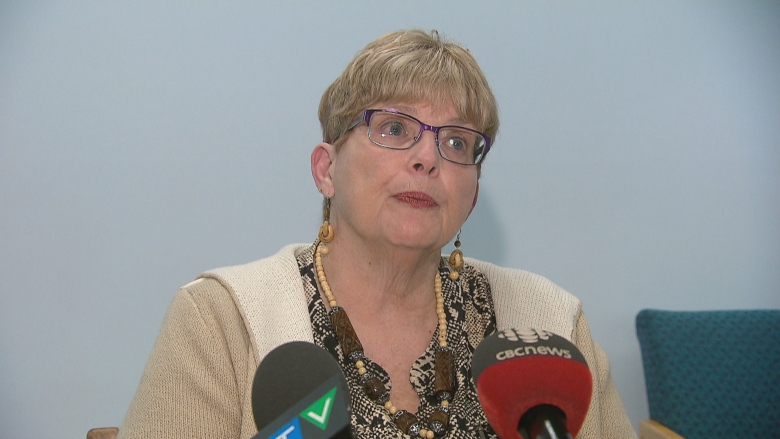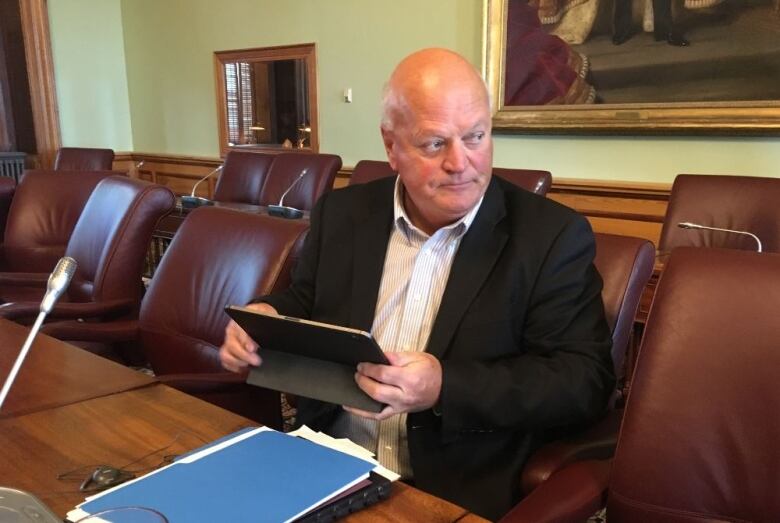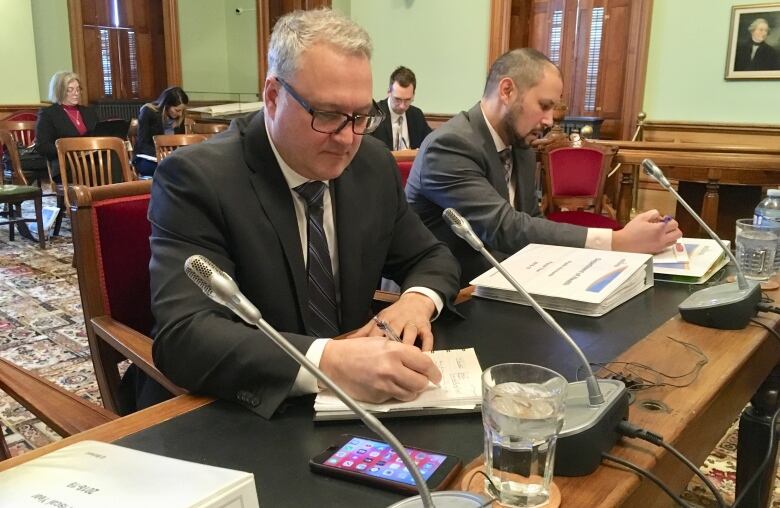Health officials blame lack of awareness, entrenched mindsets for failed health reforms
Senior health officials present to public accounts committee their reasoning for collapsed rollout

Senior health officials faced tough questions from all political parties as they appeared before a committee of MLAson Wednesday and tried to explain what one member called a "disastrous" rollout of provincial health reforms.
Civil servants from the Department of Health acknowledged that more effective communication might have prepared the ground better for the changes, which were announced Feb. 11 and cancelled just five days later in the face of widespread protest.
But the CEO of the Vitalit health authority said entrenched interests and an unwillingness to listen also contributed to the collapse of the plan.
"We had answers but a lot of people were far beyond answers," Gilles Lanteigne told the public accounts committee.
"People in the system often have interests: defend their position, defend their jobs, defend their practices, and sometimes that prevents a more reasonable, reflective discussion."

He said contrary to what Premier Blaine Higgs said Sunday, Vitalit had a plan for implementing the reforms and addressing spinoff effects on other parts of the health-care system.
But he told reporters that if a few more months of consultations lead to a broader plan, the much-needed changes could go ahead.
Higgs cancelled the plan Sunday, saying the health authorities weren't able to answer his questions about how other parts of the system would adjust once six emergency departments in small hospitals closed.
But Horizon CEO Karen McGrath told the committee there were plenty of opportunities for elected officials and others to discuss the plan in depth.
"The whole process was the two health authorities meeting regularly with the Department of Health," she said. "The minister was present, and there were meetings with the premier as well.
"There were meetings to discuss the implementation. There were meetings to discuss the communications. There were a number of meetings held with all the relevant stakeholders around the table."

The most controversial element of the plan announced last week was the nighttime closure of six small-hospital emergency departments in Sussex, Grand Falls, Perth-Andover, Sackville, Caraquet and Sainte-Anne-de-Kent.
That would allow the shifting of those staffing resources to more daytime primary care.
It also included transforming hospital beds in those hospitals to chronic-care beds for seniors waiting for spaces in nursing homes, and shifting all acute-care beds to larger hospitals.
McGrath said that was a main impetus for the plan, arguing those seniors aren't getting the service they need, such as recreation activity and emotional support.
"We have a problem with people who require another type of care, and we are providing them care in regional hospitals," she said.
She acknowledged some people would have to travel farther for emergency care but said overall the system would provide better care for more people.
"We considered the human cost of all these decisions and to suggest there isn't a trade-off, I would be lying to you."
Horizon's board chair, John McGarry, showed a flash of anger over other health-care providers who he said had initially supported the plans in private.
"We own the plan. Nobody wants to own it. Everybody says, 'Something's got to be done.' But I watch everybody's reaction to it, all those associations, I think 'you're waffling. You're walking away."
'A lot of people were in shock'
Health Minister Ted Flemming said Tuesday the fact the plan was "dead on arrival" because a majority of parties in the legislature opposed it also weighed in the decision to scrap it.
Progressive Conservative MLAs on the committee suggested to the officials Wednesday that the demographic pressures on the health-care system, including a labour shortage in many hospitals, was not clearly communicated to the public.
"A lot of people were in shock and a lot of people didn't realize what was going on," said Sussex-Fundy-St. Martins MLA Bruce Northrup, who publicly opposed the plan before it was withdrawn.

Associate deputy minister of health Ren Boudreau said the key elements of the plan "have been out there in the public" for a long time because they've been discussed for a couple of decades.
But he said greater effort could have been made to explain to the public that it's better to have planned closures than seemingly random, unexpected shutdowns of hospital services because ofunexpected staffing shortages.
"Successive governments have tried to put some of those issues out there, but because of the nature of the conversations, it's always been challenging," he said.
"If we could turn back the clock 10 years I do think that large-scale conversations around the nature of the challenges would certainly be key. Awareness probably has been our biggest challenge."
Awareness may not have been enough
But he and his boss, deputy minister Grald Richard, said it's possible that the most elaborate awareness campaign might not overcome resistance to reform.
"Even with the best communications, I think it's going to be rough, for sure, because these are hard challenges that we have to address and we can't just lay off," Richard said. "We have to do something."
Boudreau said data are clear that more lives are saved with good preventive and primary health care in a community.

But for an individual citizen who feels they need emergency care, "what you see is what happens at two o'clock in the morning, in a very singular circumstance," he said.
"From a health system point of view, what we see is that in trying to overstaff that area, which people are concerned about in the now, we end up with worse health-care outcomes.
"People are living less long because of our focus on acute care. That's really been the difficult conversation. People feel safer with hospitals in their backyard."
Boudreau said when the small hospital in Minto was turned into a health centre almost two decades ago, the reaction "was exactly the same as we saw the last week. Local doctors said people were going to die. Elected officials reacted as elected officials did."
But he said there are studies showing people in the area now are healthier than people in communities with hospitals because they have quick access to primary care.
Health Department under fire
Another PC MLA, Stewart Fairgrieve, pointed the finger at the department itself for the lack of understanding among the public.
"In light of what can only be described as a disastrous rollout, the biggest challenge in New Brunswick health care today is a lack of confidence in the Department of Health," he said.
But the Liberal Opposition faulted Higgs and Flemming for not scrutinizing the plan closely enough before its release.
Liberal MLA Jean-Claude d'Amours said he obtained correspondence from April 2019 between the department and the premier's office about a communications plan for the reforms.
Given how much time passed between then and last week's announcement, "nobody had the time to look at it and say, 'Listen, maybe we didn't ask enough questions?'
"It's insane to think the government, the premier and the health minister have not taken their responsibility to ask the proper questions."












_(720p).jpg)


 OFFICIAL HD MUSIC VIDEO.jpg)
.jpg)



























































































